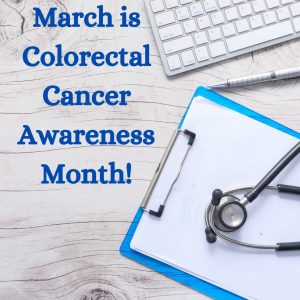
You’ve been hearing about it more and more, and it’s true: Colon cancer is the third-leading cause of cancer deaths — but it can be prevented! Early detection is key. For everyone. Because an increasing number of people younger than 40 are being diagnosed with colon cancer … which we can all work to change.
Keeping yourself colon-cancer free means educating yourself about your risk factors, and taking care of your colon by getting a colonoscopy (at age 45, or sooner if you have risk factors).
Risk Factors
Cancer can develop without symptoms that you notice, but when you know your risk factors, you can be more aware of the potential for it to develop — and you can help prevent colon cancer or detect it in its earliest stages in order to increase your survival rate.
Family History
Know your family history: Has anyone in your direct bloodline (including parents, siblings, or children) been diagnosed with colon cancer? It’s also important to know if any of them had any precancerous polyps that were detected, or any hereditary syndromes that may impact your chances for developing cancer.
Personal History
Beyond that, it’s vital to monitor your own personal history. If you have had any precancerous polyps detected in a prior colonoscopy, no matter how long ago, it’s imperative to continue monitoring things and having routine colonoscopies. Additionally, if you have other health conditions, you may be at increased risk.
Diet
While we are still learning more and more every day, some studies indicate that there may be a chance that what you eat can impact your risk for colon cancer.
In general, we’d love for everyone to eat a balanced, healthy diet full of fresh foods — for a plethora of reasons — and if it helps lower your risk for colon cancer, we’re all for it.
Missing a Colonoscopy
You know it’s something you have to do, but you put it off. But not getting your colonoscopy when you should puts you at greater risk of developing colon cancer in its later stages, which makes it less treatable. In fact, colon cancer mortality doubles if you skip your colonoscopy.
How to Prevent Colorectal Cancer
You know your risk factors, and you’re discussing them with your doctor. The number one way for you to prevent colon cancer is to have a colonoscopy — by age 45, or sooner if you have those risk factors.
A colonoscopy isn’t just about detecting if you already have colon cancer: A colonoscopy can prevent colon cancer by actually looking into your digestive tract to see if there are any polyps hanging around. Polyps usually have no symptoms, so we need to be able to have a camera go through to see. And those polyps can be precancerous — so by locating and removing them, we’re able to prevent colon cancer.
For anyone with colon cancer risk factors including a personal history of colon polyps or a family history of colon cancer, a screening colonoscopy, not a stool test, is the right test for you.
In addition, you want to follow tips for a healthy colon to reduce the chances of those polyps even developing in the first place.
Again, what you eat can also play a part: Diet can help prevent colon cancer. Taking care of your health now is benefitting you in the long run — so go ahead and schedule your colonoscopy today!
Call Gastrointestinal Specialists, P.C.
We’re seeing patients for all your intestinal concerns and scheduling colonoscopies — even our Colonoscopy Now — so contact us today to set up your appointment!